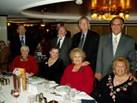

Alzheimer Hot Line
1-800-272-3900
Open 24 Hours a Day
JOAN’S BLOG – MON/TUE, APRIL 20/21, 2009 – THE TYPE OF LONELINESS ONLY A SPOUSE CAN UNDERSTAND
When new members find this website, read the Previous Blog, Alzheimer Article sections, and the message board topics about loneliness , the overwhelming emotion is relief
, the overwhelming emotion is relief . Relief that they are not the only spouse of an AD patient who understands the unique type of loneliness they suffer. They are comforted by the affirmation and experience of the veteran members – We all feel it; we all experience it; we all agree that it is deep and painful. Our spouse is there in the flesh, but cannot "connect" with us as they once did. We are alone and lonely.
. Relief that they are not the only spouse of an AD patient who understands the unique type of loneliness they suffer. They are comforted by the affirmation and experience of the veteran members – We all feel it; we all experience it; we all agree that it is deep and painful. Our spouse is there in the flesh, but cannot "connect" with us as they once did. We are alone and lonely.
This weekend, the “loneliness” topic filled up on the message boards, which prompted me to post a revised version of a blog I had written in August 07 on this subject. See below:
THE LONELINESS YOU FEEL- revised from Aug.07

The dictionary defines loneliness as being “Without friendly companionship, company, or support” –. In previous Blogs - Meeting Our Emotional Needs; Socialization and Friendships; Sex and Intimacy; I discussed how when our spouses can no longer be our best friends, cheerleaders, lovers, sounding boards, and comforter-in-chief, we are left with heartache and emptiness where there was once a full, mutually satisfying partnership. When friends and family desert us, the loneliness is complete and overwhelming.
In each stage of the disease, we deal with a different type and level of loneliness. In the early stages, when our spouses are still functional, we lose the enjoyment and satisfaction of adult conversation. When your spouse is slow to process language, misinterprets most of what you say, and does not understand the rest, conversation with them loses its allure. When you have to explain what you mean, break down the information into small segments, and give only one direction at a time, you pretty much pack it in and stop trying. It’s like attempting to have an adult conversation with a two-year old . Without the stimulation of interesting conversation, you start feeling lonely.
. Without the stimulation of interesting conversation, you start feeling lonely.
When your spouse reaches the stage in which they are not sure who you are, interactive, meaningful conversation is non-existent. You are truly in the parent/child mode. You are comforting them when they are fearful of you, of imaginary threats and terrors, and of their surroundings. You reassure them, guide them, and calm their fears, but that leaves you totally bereft of someone to converse with. Now the loneliness intensifies. 
When your spouse no longer knows you at all, and is a shell of their former selves, you bear the loneliness of a widow/widower, but it is worse. You do not have closure – you cannot move forward – you experience the daily pain of observing the living breathing body that used to house your best friend and lover, but the person inside has been cruelly snatched away by Alzheimer’s disease. Your loneliness is complete. 
Once again, the research I have done on this subject has been lacking in substance. To paraphrase the research studies, they conclude…………… SPOUSES OF ALZHEIMER PATIENTS ARE PRONE TO STRESS AND LONELINESS. AND WE DIDN’T KNOW THIS?
No one can take the place of your spouse in filling your heart  and easing your loneliness. But we have to make adjustments.
and easing your loneliness. But we have to make adjustments.
Those of you who have been reading my blogs regularly, know how lucky I am to have a unique support group of caregivers AND their spouses with AD, who have formed a social network . We are friends outside of our support group. We get together at each other’s houses; we travel together
. We are friends outside of our support group. We get together at each other’s houses; we travel together ; we go to movies and dinners together; we have parties. We wives of the husbands with AD, occasionally get together for a “girl’s gab session
; we go to movies and dinners together; we have parties. We wives of the husbands with AD, occasionally get together for a “girl’s gab session ”, where we vent, cry, laugh, and offer support to one another. While we are out, we leave the guys together at one of our houses to have a “guy session”. There are enough of them who function at a level that allows them to keep an eye on those who are at a lower level. Cell phones abound, and we are never more than 15 minutes away. Our social situation goes a long way to ease loneliness.
”, where we vent, cry, laugh, and offer support to one another. While we are out, we leave the guys together at one of our houses to have a “guy session”. There are enough of them who function at a level that allows them to keep an eye on those who are at a lower level. Cell phones abound, and we are never more than 15 minutes away. Our social situation goes a long way to ease loneliness.
This, of course, is an unusual and ideal situation. I would suggest that you urge the social workers in your chapter to adopt this type of support group. Our group model started because ONE SPOUSE worked to get it done. Our group was designed by one man who saw a need and made it happen. We meet twice monthly for 90 minutes. All of us - caregivers, those with AD, and the social workers, meet together for the first 30 minutes to talk about general information – any news about conferences, announcements by anyone – good news, bad news, birthdays, etc. Then the group splits. The caregivers go with one social worker and those with AD/dementia go with another social worker. We have an hour to discuss our issues. When we’re finished, as many who are able, go out to lunch together. It is therapeutic and loneliness relief for caregiver AND patient.
Even if you have a support group of caregivers only, why not seek out members of that group, with whom you feel a connection, and become “phone buddies ”. Maybe you can actually get out of the house for a lunch get-together.
”. Maybe you can actually get out of the house for a lunch get-together.
Recruit a family member or friend to stay with your spouse one day a week, or hire someone if you have the funds, so you can get out and be with people – a lunch, a card game, a movie, ANYTHING that will give you the opportunity to talk and socialize.
– a lunch, a card game, a movie, ANYTHING that will give you the opportunity to talk and socialize.
You have many friends on our message boards who understand the loneliness and are always here to listen and respond. I know that does not take the place of the conversation and companionship you miss from your spouse, but even though that connection is waning and disappearing, we all still need some type of human interaction, whether it be from the phone, Internet, or those friends and family members who may be willing to give you some respite, so you can get out and interact and converse with people on your intellectual level.
Please post comments on the message board topic:
Joan's Blog - More on Loneliness
Feedback to joan@thealzheimerspouse.com
The material included on this website contains general information intended as information only. This site is not intended to provide personal, professional, medical, or psychological advice, and should not be relied upon to govern behavior in any certain or particular circumstances. The opinions in the blogs are solely those of the owner of the website. The opinions on the message boards are not necessarily endorsed by the owner of this website, and are the opinions of those persons writing the messages. All material on this web site is for demonstration and informational purposes only.
The Alzheimer Spouse LLC 2009 All Rights Reserved

Custom Search
|



























